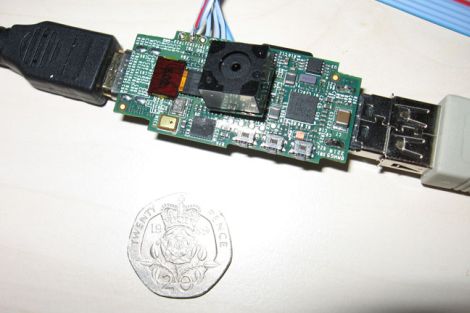We are always looking out for smaller yet capable computers for our projects, and this newest offering by [David Braben] is looking mighty nice. [David] is the head of a UK-based games studio, but has recently been focusing on bringing small, affordable PCs to classrooms around the world.
The computer, called Raspberry Pi, is about the size of your standard USB thumb drive and contains a 700 MHz ARM 11 processor as well as 128 MB of memory. It has an HDMI port which can display 1080p video on any compatible screen, along with a USB port for input peripherals. Mass storage is provided courtesy of an on-board SD card slot, and it looks like the ability to utilize add-on modules will be available as well.
There is sure to be no shortage of willing buyers if [David] is able to bring these computers to market within a reasonable timeframe. With a projected cost of about $25, this will certainly give the OLPC and others a run for their money.
Thanks to everyone who sent this story in… all of you. You can stop now… please. (don’t stop sending us tips, we’re just joking around)
















Which is one of the reasons I use it. I would love to see more people using it, but that’s just me. I under stand why Windows is so big and appealing, and don’t really have a problem with that. But come on, the OS is more expensive that the computer? I’ve been using Microsoft since DOS. The latest versions haven’t really added all that much, and in some cases removed things instead. So I don’t see the reasoning for charging full price for a slightly modified tweak of the OS. They recouped the investment many years ago. But they have a right to charge what the market will bear. So I use and promote Linux.
aeternus: The bifferboard supports the 486 architecture with no FPU. Most existing software expects an FPU and at least a 586, so there’s a good chance you’re going to have to recompile everything anyway. (Debian supports 486s still in theory, but their ARM support is a lot better tested.)
@makomk
Most existing software expects FPU support in the kernel which can either be via a real FPU or the kernel provided emulation. There was at one point a way you could compile libc so that FPU emulation was included (slight performance gain due to not going via the kernel interrupt) but that seems to have been abandoned – perhaps you’re getting confused with that? Nobody does that now because the performance gain is generally not worth the (considerable) hassle.
So lack of real FPU is a complete non-issue for Linux, unless you actually need the speed, of course.
As for packages, Slackware has kept with 486-compatible packages right up to v13. I haven’t checked 13.1 since I’ve now gone 64-bit.
Many Debian users are using the Bifferboard with 486 packages. Although I don’t use it myself there have been various write-ups on what is involved, and nobody seems to have any problems with them. There is a fair amount of support on the group for this kind of thing, so I’d say there is virtually no chance of everything needing to be recompiled.
Some links to check about the distributions:
https://sites.google.com/site/bifferboard/Home/desktop-linux-distributions
Having said all of that, Bifferboard is certainly not ideal to run such ‘desktop’ distributions and is better suited to OpenWrt, which is what we ship with the boards.
Micro clusters??? sounds like a plan :P
That will never work…
It worked.